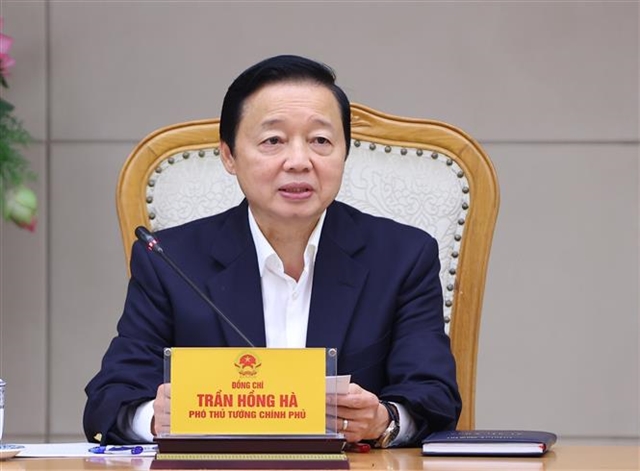
|
| Deputy Prime Minister Trần Hồng Hà chairs a meeting to discuss the draft of three decrees guiding the implementation of the Law on Roads. VNA/VNS Photo |
HÀ NỘI — Deputy Prime Minister Trần Hồng Hà chaired a meeting with ministries and agencies on Tuesday to discuss three draft decrees guiding the implementation of the Law on Roads, with a focus on enhancing decentralisation and delegation in the investment and development of road infrastructure.
The three draft decrees are guidelines on certain articles of the Law on Roads and Article 77 of the Law on Road Traffic Safety and Order; a decree on the transportation of hazardous goods, detailing a list of dangerous items, transportation regulations and procedures for obtaining licences and training certification for drivers transporting hazardous goods by road; and a decree on driver training, outlining activities related to training and examinations.
A report by the Ministry of Transport showed that the draft decree consists of nine chapters and 71 articles, covering topics such as planning for road infrastructure; classification, responsibility for management, operation and maintenance of roads; assignment of road names and codes; land allocation for road protection and maintenance; road safety corridors; installation of signs and infrastructure within road protection zones; the road database; smart traffic management systems and other issues.
The draft decree aims to drive a breakthrough by reinforcing decentralisation and delegation in the development and maintenance of road infrastructure.
The drafting committee incorporated feedback on procedural steps for assigning provincial People’s Committees to manage national highways, and clarified cases where roadsides may be temporarily used for non-traffic purposes.
The Ministry of Transport explained provisions on road safety inspection, training and certification of road safety inspectors, the road database and smart traffic management systems.
Delegates discussed unresolved issues, such as the handover of national highways passing through special urban areas, local management and investment in national highways and timelines for investing in highways to meet complete expressway standards.
Emphasising the principle of decentralisation for local authorities, Deputy PM Hà directed the Ministry of Transport to inspect, monitor and supervise the management, operation and maintenance of national highways by localities.
He highlighted the importance of comprehensive management of the national road network, with the ministry directly overseeing key expressways and vital national highways, especially those concerning national defence and security.
Criteria should be developed to distinguish which highways should be delegated to local authorities and which remain under the ministry’s management, he added.
Regarding regulations for rest stops on expressways, Deputy PM Hà noted that planning, design and approval for expressway projects must include standards for the scale and design of rest stops to ensure driver safety, environmental protection and provide services for people and vehicles. Methods for mobilising social resources such as investment from expressway operators, bidding processes and public-private partnerships should be transparent.
On the draft decree concerning the transportation of hazardous goods, Deputy Director of the Road Administration Phan Thị Thu Hiền stated that it includes a list of hazardous goods, guidelines for transporting them, permits for transportation by road and training certification for drivers handling hazardous goods.
Special provisions are in place for the transport of radioactive substances, weapons, explosives, support tools, explosive precursors, fireworks and hazardous waste.
A key issue raised was determining authority over licensing for hazardous chemicals of types 5 and 8, which has been under the Ministry of Science and Technology since 2009.
The Deputy Prime Minister requested that the drafting committee reference regulations from relevant specialised laws concerning chemical management authority and review their compatibility with the Civil Defence Law.
For the draft decree on driver training and licensing, he proposed that training centres should not be required to qualify as vocational institutions and outlined conditions and standards for driving instructors.
He assigned the Ministry of Public Security to work with relevant agencies to ensure that the regulations in the draft decree align with road traffic safety and vocational training laws. – VNS




